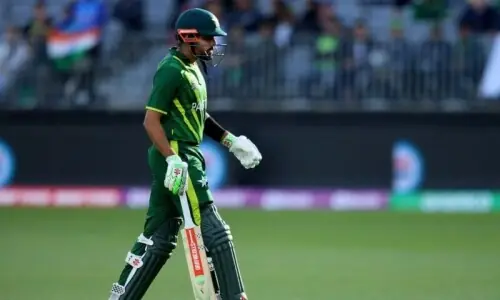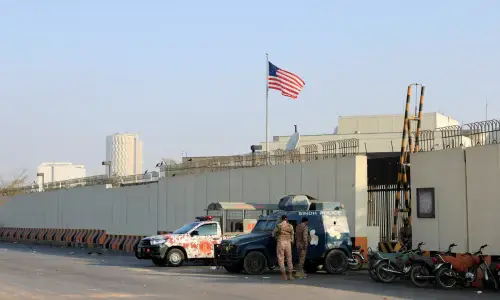Russian enigmas and tragedies
LAST week Russia’s highest court rescinded a Kremlin decree that would have compelled the media to desist from discussing the backgrounds or analyzing the policies of candidates in next month’s parliamentary elections.
Had it been allowed to stand, the law would also have obliged newspapers and broadcasters to give equal coverage to every candidate in a constituency — a near-impossible task, given that there are more than forty parties competing for votes.
Perhaps inevitably, the stricture elicited comparisons with Soviet-era censorship — even though they are valid only to a point. After all, until the late 1980s, elections in the USSR were non-competitive and therefore farcical. Mikhail Gorbachev by degrees introduced choice into the phenomenon, but the USSR was dissolved before the experiment in pluralism had gone very far.
As a consequence, we shall never know what a substantially democratic Soviet Union might have looked like. It is possible, on the other hand, to assess the post-Soviet political process — and there isn’t much to be said of it either in Russia or in most of the other former constituent republics of the union. The problem in several cases appears to be a desire on the part of the political elite (much of it derived from the Communist Party of old) to combine authoritarian governance with neo-liberal economics.
If the mix of old and new currently finds its most controversial manifestation in Azerbaijani leader Haidar Aliyev’s desire to be succeeded by his son (a reflection of the Asian, rather than the Soviet, model), post-Sovietism has most prominently — and least promisingly — been epitomized by Boris Yeltsin, who exploited the hardline coup attempt of August 1991 to organize one of his own. Having succeeded in relegating the Soviet Union, Yeltsin broadly followed a two-pronged approach aimed at accumulating presidential power and marketizing the economy via “shock therapy”.
The consequences of the latter were summed up earlier this year by Joseph Stiglitz, Nobel laureate and professor of economics at Columbia University, who wrote: “The move from communism to capitalism ... was supposed to bring unprecedented prosperity. It did not. By the time of the rouble crisis of August 1998, output had fallen by almost half and poverty had increased from two per cent of the population to over 40 per cent. Russia’s performance since then has been impressive, yet its GDP remains almost 30 per cent below what it was in 1990. At four per cent growth per annum, it will take Russia’s economy another decade to get back to where it was when communism collapsed.”
On the political plane, the reformers didn’t falter on such a monumental scale; but relative success involved declaring war on the Russian parliament ten years ago. The Kremlin repeatedly blocked thorough investigations into the events of October 1993, but information and accounts that have recently come to light tend to confirm suspicions that the crisis could have been resolved without bloodshed. It now appears the president’s supporters set up a provocation in order to justify the shelling of parliament. Throughout the dramatic events, Yeltsin thrived on western moral support — and he continued to bask in the glow of the capitalist world’s adulation even after his dictatorial intent, not to mention his indifferent health and psychological instability, became painfully obvious.
He was able to name an heir before making a barely dignified exit from the political stage. Vladimir Putin cannot be described as a Yeltsin clone: whereas Tsar Boris was rotund, ostensibly jolly and rather too fond of vodka, his successor is slim, grim and sober. He does, however, appear to share his mentor’s authoritarian tendencies, and has lately been surrounding himself increasingly with former colleagues from the FSB (the secret police force that replaced the KGB).
Although Putin is viewed approvingly by many Russians as the sort of strongman their country needs, his party isn’t a vote magnet — and a particularly dismal showing at next month’s polls could affect his prospects in presidential elections scheduled for March 2004. Putin also appears to enjoy the confidence of powerful peers such as George W. Bush, despite having withheld Russian support for Dubya’s Iraqi misadventure. That would have sufficed as a cause for concern, but what’s even more ominous is the vicious streak that emerges whenever any press correspondent raises the question of Chechnya. Putin often responds not with any sort of explanation or justification, but with bitter personal invective.
In judging the political direction of post-Soviet Russia, it wouldn’t be fair to dwell preponderantly on personalities, but there are many ways in which the Yeltsin and Putin presidencies illuminate the limits of democracy. Gorbachev’s insistence that the peoples of the former Soviet Union are as yet very much in the process of choosing their ways of life, and that a judgment passed at any given juncture must necessarily be interim in nature, is perfectly valid. History may alter its pace, but it does not pause. But human beings do — to reflect, to make sense of their lives. And it is, naturally, difficult to turn around and say to the millions of Russians marginalized by the supersession of the Soviet Union: “Enjoy all your new freedoms — there’ll be jobs for many of you once the investment climate improves, but don’t hold your breath...”
Well-intentioned but vain, Gorbachev remains keen on historical vindication despite the series of failures that led to the demise of the USSR. A fascinating insight into the evolution of his thought processes over the years is provided by Conversations With Gorbachev, a slim volume containing transcripts of discussions in recent years between the last Soviet president and Zdenek Mlynar, a leading participant in the Prague Spring of 1968, who spent the next twenty years exiled from his native Czechoslovakia.
Mlynar and Gorbachev have known each other since they were both students at Moscow University; they communicate, therefore, as equals — and although their views on most matters are similar, Mlynar does not allow his friend the luxury of evasiveness.
As a rising party apparatchik, Gorbachev sympathized with Nikita Khrushchev’s de-Stalinization process, but was also complacent about Khrushchev’s ouster. When he moved from the provinces to Moscow in the late 1970s, he brought with him a vague vision of reform that envisaged the revitalization of socialism primarily through a restructure of the Communist Party. As he acquired a deeper understanding of the Brezhnevite malaise, he realized that more far-reaching changes were required.
Among the more contentious aspects of Gorbachev’s rule was the pace of change. Would it have been possible to preserve the Soviet Union, as well as some of the gains of the October Revolution, had perestroika and glasnost been introduced more gradually? That is now an academic question, but it’s worth recalling that Gorbachev was under tremendous pressure through much of his tenure both from the party nomenklatura, which resented change, and from radicals who insisted on a more rapid transformation.
In the end, Gorbachev’s project was betrayed by both sides: although the failure of the August 1991 coup bid bore testimony to the efficacy of the reform process, the hardliners’ last stand also gave the Yeltsinites an opportunity to make a decisive break with the past.
It is difficult to disagree with Mlynar and Gorbachev’s belief that there can be no socialism without democracy. And it is instructive to note that Gorbachev’s impetus for reform was derived in part from his perusal of Vladimir Lenin’s last articles and statements (many of which remained unpublished in the USSR for decades): Gorbachev discerned in them a sense that Lenin was keen to reverse Bolshevism’s drift away from democracy.
The vitality of the initial revolutionary period from an outsider’s point of view is engagingly captured in R.H. Bruce Lockhart’s Memoirs of a British Agent. Lockhart served as diplomat in Russia both before and after the revolution. The latter mission was devoted primarily to the task of convincing the communists to keep fighting the Germans. In that he failed — although Leon Trotsky was sympathetic, Lenin was adamant about peace; and Trotsky, writes Lockhart, “was as incapable of standing against Lenin as a flea would be against an elephant”.
Lockhart was later implicated in a plot to assassinate Lenin and Trotsky and deported, but claims to have been innocent of the charges — as well as fundamentally opposed to the Allied intervention against the Bolsheviks, which played a significant role in promoting totalitarian tendencies. The most interesting aspects of his account involve encounters with various commissars. At a meeting of the party’s Central Committee, he recalls his only glimpse of Stalin. “I paid little attention to him,” writes Lockhart. “He did not seem of sufficient importance to include in my gallery of Bolshevik portraits. If he had been announced then to the assembled party as the successor of Lenin, the delegates would have roared with laughter.”
The assembled party would have been equally amazed to know that most of them would eventually be executed at Stalin’s behest. The more’s the pity, then, that at a time when European social-democracy appears to be in its death throes and Russia’s periphery is dotted with American military bases, many of the hardy souls who will venture into the streets of Moscow or St Petersburg this Friday will be carrying portraits of Stalin. Among Russia’s many tragedies, one of the profoundest is that of lessons unlearned.
Email: mahirali2@netscape.net
India and the APHC
AFTER some exchange of undiplomatic words, designed to satisfy the hardliners in both countries, it appears that the Pakistanis and Indians have committed themselves to a dialogue — albeit at a technical level — to start the process of restoring the communication links that existed between the two countries prior to the massive deployment of military forces on the border in December 2001.
Given the nature of relations between India and Pakistan, given also the umbrage in Pakistan at Indian rejection of Pakistan’s constructive proposals regarding the creation of conditions for a meaningful dialogue on Kashmir and, finally, given the circumstances in which the proposals were made it is perhaps understandable that many have been rejected or been postponed to a later day.
It was perhaps too much to expect that Pakistan, recognizing that the proposals for the reopening of the Khokrapar rail or road link and the Karachi-Mumbai ferry service were a “public relations” exercise, would accept them immediately. Equally it was perhaps too much to expect that India would do anything other than dismiss the involvement of the UN in the proposed creation of communication links between Azad Kashmir and Indian Occupied Kashmir and the Pakistani offer of various forms of assistance to the Kashmiris.
The fact is that were there even a modicum of mutual trust, all these proposals could with appropriate modifications be implemented to the benefit of the people and particularly the benefit of divided families.
The path of even a limited dialogue, scheduled to commence in the first week of December, is uncertain. India seems to be insisting — even though it had made twelve proposals — that movement towards the implementation of even those that have been mutually agreed, would depend on the outcome of the discussions on the resumption of overflights and the restoration of bilateral air links. Pakistan has carefully avoided suggesting that a foolproof guarantee against any future unilateral suspension of over-flights would be needed before an agreement can be reached but it is likely that Pakistan will insist at least on a reiteration of the international obligations both countries have accepted to promote civil aviation.
It may be said that the snail’s pace at which the restoration of the pre-December 2001 status quo is proceeding — it has been thirteen months since the troop withdrawals began and almost seven months since Prime Minister Vajpayee extended the “hand of friendship” — serves India’s purpose well. The “game plan”, as enunciated by Mr Vajpayee in his New Year message and reiterated obliquely in his UN address, seems to be to evade high-level talks with Pakistan until it can persuade Pakistan to accept that such talks should initially be on subjects other than Kashmir and until it has bludgeoned the Kashmiris into accepting the permanence of the Indian occupation.
Pakistan’s perspective should be different. Even in the extraordinarily difficult Indo-Pakistan relationship, such palliative or trivial steps as are currently envisaged cannot be prevented from lending a forward dynamic to the overall relationship. The quicker the links that existed prior to December 2001 are restored the quicker Pakistan can ask for a dialogue that begins from where it was left off in Agra.
India’s complacent belief that, given the West’s obsession with terrorism, it will continue to enjoy the support of the international community in avoiding high level dialogue could prove ill-founded particularly if Pakistan takes steps on the ground to reinforce the assertion that it (Pakistan) is doing all it can to curb infiltration across the line of control. It may also find the international community viewing with greater favour Pakistan’s proposal for a ceasefire along the LoC, since it has been the Indian claim that artillery shelling on the LoC provides the cover for “infiltration”. Clearly such an outcome will need hard work on Pakistan’s part, both in terms of action on the ground and in diplomatic activity in the various capitals, but it is an achievable goal. There is even a prospect though it may appear remote at this time that the Saarc summit will provide the occasion for the first informal exchanges in this regard.
The real purpose of this article however is to see how the Indians are proceeding with the second element of the “initiative”, namely the dialogue with the APHC. It has been Pakistan’s contention, and that of the international community that any agreement reached between Pakistan and India on Kashmir must be such as satisfies the aspirations of the Kashmiri people or, more loosely, is found acceptable by the majority of the Kashmiris. Bearing this in mind it has been an Indian ambition to hold a substantive dialogue with Pakistan on Kashmir only after reaching an “agreement”, with the “separatists” in Kashmir, of a sort that could be presented to Pakistan as a “fait accompli”.
Indian efforts at engaging the Kashmiris for this purpose are not new. Even before the BJP government’s advent there had been statements by the then prime minister, Narasimha Rao, promising the Kashmiris anything “short of Azadi” as the price India was prepared to pay to secure an end to the freedom struggle. The BJP government did not follow up on this offer but it did seem to encourage Farooq Abdullah’s government to set up a committee of legislators to determine the measure of autonomy the Kashmiris wanted and then promised that the report of this committee would be given due consideration, if memory serves me correctly, by the Indian Cabinet and be discussed in the Indian parliament. Despite Farooq Abdullah’s best efforts the process went no further. The report of the Kashmir legislative committee remained a dead letter.
Similarly the ceasefire offer by the Hizbul Mujahideen, in the orchestration of which the RAW appeared to have had a hand (when Majid Dar arrived from Dubai to make the announcement he was accompanied by RAW agents) created a stir but eventually fizzled out. The Indian government insisted that discussions could only be held on solutions that fell within the parameters prescribed by the Indian constitution and the Hizb leader Syed Salahuddin disassociated himself from the initiative taken by his lieutenant.
This was followed by the Ramazan announcement of the non-initiation of combat operations under which the Indian forces were ordered to carry out no offensive operations against the freedom fighters and only to defend themselves if attacked. This too did not serve the purpose of initiating the dialogue that the Indians wanted with the Kashmiris.
This order was eventually rescinded and simultaneously in May 2001 President Musharraf was invited to visit New Delhi. This seemed to suggest that India had decided, at least temporarily, that talks with Pakistan rather than talks with the Kashmiris would be pursued for a Kashmir solution.
The inconclusive discussions in Agra would not have meant the abandoning of this path but the events of September 11, the Indian conclusion that this had now given added credibility to the Indian assertion that Kashmir was purely a problem created by externally fomented terrorism, the terrorist attack on the Indian parliament and the international community’s acceptance of the Kashmir elections as free and fair all provided the BJP hardliners the excuse they needed to argue that no deal with Pakistan was necessary.
The Indians also believe that these events have also had their impact on the APHC. A split developed in the APHC over the question of participation in the state elections. An important faction — Abdul Ghani Lone’s party — was accused rightly of having supported candidates in the state elections and Ali Shah Geelani insisted that Lone’s party be thrown out of the APHC. This did not happen and Geelani then assumed leadership of his own faction of the APHC.
Currently the situation is that the APHC faction headed by Maulana Abbas Ansari has welcomed the offer of talks and has trumpeted the Indian decision to have Advani conduct the talks on behalf of the Indian government as a vindication of the APHC’s refusal to talk to the various special representatives that the Indian government has appointed from time to time. He has downplayed the fact that Advani has said that these talks will be about the decentralization of power and has expressed the hope that the formal invitation letter for the talks, which the Indian Government has yet to issue, will make it clear that the talks will be unconditional exactly as the Kashmir chief minister, Mufti Mohammad Sayeed, has been saying. He has at the same time been emphasizing that these talks will be held after discussions with the other components of the freedom struggle including those that now form part of the Geelani faction.
There will be a lot of manoeuvring between now and the end of Ramazan when, according to an Indian spokesman, the Maulana Ansari faction of the APHC will be ready for the talks. It does not seem likely that the Indians will succeed in having the talks, since apart from the rejection of such talks by the Geelani faction even Ansari’s own faction is divided on the issue. It is also unlikely that Advani’s formal letter of invitation will be able to offer unconditional talks to the APHC.
In August 2000 Mr Vajpayee had tried to suggest that the talks with the Hizbul Mujahideen be held on the basis of “insaniyat” rather than the parameters of the Indian Constitution but was forced to then state explicitly that the Indians would only talk on the basis of the Constitution. A similar constraint will probably apply now.
On the Kashmiri side also there is a realization that even if the talks are billed as unconditional the Indians have no intention of putting much on the table and that if the Kashmiris do not have Pakistan in their corner their negotiating position will be extremely weak. It would seem that nothing is likely to emerge from this initiative beyond securing for India a further acknowledgement from the international community that a “serious” effort had been made to address the internal dimension of the Kashmir problem.
The writer is a former foreign secretary of Pakistan.
Pay raise for US senate
Finally, the U.S. Senate has generously agreed to accept yet another pay raise. Not every American would be up to this kind of daunting task, accepting a fifth raise in five years. It takes courage in a time of war against terror, chaos and ballooning budget deficits to hike your own salary by 15 per cent or $21,000 over those years, with no proof whatsoever that your productivity has improved even 1/15th of one per cent.
It is hard work being a senator. Only 100 women and men are up to it. You labour, say, Tuesday through Thursday, meet with staff, talk to prying media and bothersome constituents, sit through parts of interminable committee meetings and endure more recesses than a day-care center. Then you’re expected to get by on $158,000 salary a year, not counting personal wealth, free foreign trips, speech honorariums and health-care and retirement benefits.
Senators did America a favor. If they had declined this latest raise, how would we square such decorum and taste with the reputation of Capitol Hill, where elected folks do what they want anyway and then, if someone notices, cite a convenient cover story to prove necessity?
Here’s how these things get arranged to leave no traceable political fingerprints: A 4.1 per cent cost-of-living increase for most federal workers is slipped into the fiscal 2004 budgets for the Transportation and Treasury departments. Can’t do without those departments, right? We need this bill. Under a carefully complicated formula, congressional pay raises automatically take effect with that bill unless the Senate votes to exempt itself. This way no one need admit ever voting for his or her own raise.
As usual, Sen. Russ Feingold, who returns all raises to the Treasury, proposed exempting the Senate from them. As usual, his idea was tabled, with Sen. Dianne Feinstein voting against him and Sen. Barbara Boxer not voting. Now, 100 solons declining a raise won’t solve worsening federal deficits. That would take political courage.
—The Washington Post
‘Civilization’ to ‘WMD’
SECOND World War posters warning that “careless talk costs lives” embodied an enduring truth. Then the fear was that fifth columnists might overhear conversations of value to the Nazis. Elsie: “Can you take the kids to the park?” Herbert: “Sorry, ducks, it’s D-day. I’ll be invading Normandy all week.” The equivalent US slogan was “loose lips sink ships”.
Sixty years on, in another era of conflict, the careless talk comes more often from politicians — but it is potentially just as deadly. When George Bush, soon after September 11, referred to a “crusade” against Al Qaeda, he helped persuade the Muslims that they were under renewed attack from Richard the Lionheart in a US navy bomber jacket. In the context of a mooted “clash of civilizations”, Bush’s loose use of language was not only insensitive. It was unthinkingly reckless.
Bush has avoided the word “crusade” ever since. But he still regularly talks about the need to defend “civilization” and “the civilized world” against “dark forces”. He never quite says which part of the planet is the “uncivilized” or “dark” bit. Perhaps he means Kandahar. Or Eastbourne. It is unclear. But the unspoken implication is deeply divisive, even racist, not to say insulting.
Given that words, spoken, written or broadcast, are our main form of communication, and given that words have such inherent potency, it is a wonder that today’s sound-biting leaders are not more careful what they say. In short, they should mind their language. Words can define how a people or a nation sees itself: the US declaration of independence is one obvious example. Yet modern-day Palestinians also see themselves engaged in a struggle for “independence” and “freedom” from external oppression. The US ignores such semantic paradoxes.
Or take last month’s nuclear arms talks in Tehran. What mattered to the Iranians as much as enriching uranium, it transpired, was that national “sovereignty” and “dignity” be upheld. In such cases, words become symbols and benchmarks, as important, if not more so, than the “actions” (not words) that are ostensibly more significant.
Words such as “imperialism”, “emancipation”, “self- determination” and “liberation” define how history is scripted, how the future will be shaped, how contemporary conflicts are perceived and thus how they may or may not be resolved. Terrorism is a salient case in point. In the abstract, “terrorism” is a terrible thing; everybody deplores it; nobody supports it. Why then is terrorism such a growth industry? Because its definition is not agreed. It depends where you stand. Terrorism has, thus, become a much abused, highly fungible term.
For Donald Rumsfeld, for example, the weekend helicopter attack at Fallujah was simply the work of “terrorists”. That statement conceals a larger, unpalatable truth. To the oppressed of the world, the men of violence are, variously, militants, freedom-fighters, guerrillas, insurgents, heroes, martyrs. The real terrorists belong to the “other side”. Yet “state terrorism” is a concept that is barely recognized by the ostensible oppressors. Which brings us back to Bush. By declaring an open- ended, global, no-holds-barred “war on terror”, Bush invited every aspiring autocrat to do his worst in the name of “security” (another much-scandalized word).
From Chechnya, Xinjiang and Indonesia to Colombia, Saudi Arabia, Uzbekistan, Pakistan, Palestine and the Philippines, the anti-terror “war” has expanded exponentially with Bush’s blanket blessing. One never would have guessed there were so many terrorists! In this loose-lipped, rapid-fire lingo, such people, whether killed or locked up in Bagram or Guantanamo or a thousand other hell-holes, are by definition “evil”.
Here, you might think, is another trip-wire for the unwary, to be sidestepped by sensible politicians in the secular, rational west. Not a bit of it. Ronald Reagan denounced the “evil empire” of Soviet times. But Bush, author of the “axis of evil”, Tony Blair and others have gone for linguistic broke. Not for them, it seems, any deep reflection on the moral connotations of their language. The world divides into biblical good and bad, black and white. Blessed are the peacemakers; battered are the “evil-doers”.
Little wonder that General William Boykin, a leading Pentagon Christian soldier, could declare that the US was at war with Satan, that Muslims worshipped idols, and the only true god (not Florida or the supreme court) had picked Bush for president. Italy’s Silvio Berlusconi has strayed into the same Islam- denigrating territory. Malaysia’s Mahathir Mohamad let slip his own counter-bigotry last month, claiming that Jews “rule the world by proxy”. Such crass slurs are enough to make a philologist pine.
The latest addition to pol-speak, to the modern leader’s essential lexicon, is WMD. This is now a universally understood term, or so you might think. WMD is proliferating, it’s deeply frightening, and it’s coming to a cinema or tube near you. Yet totemic WMD is also a reason why civil liberties are everywhere under siege, why military budgets are rising, why the developing world is not developing, and why your opinion is ignored. In fact, WMD is a vague, non-specific term that can be (and is) used to cover a multitude of supposed sins. Developed countries have their own WMD, of course, but their arsenals are somehow deemed acceptable. Not so the WMD that may or may not exist in developing countries or “rogue states” (whatever that means). This species of unauthorised WMD is deemed destabilising.
There are certain words, conversely, that the west’s leaders gingerly eschew. These include “resistance” — too encouraging a label for the rag-taggle “remnants” opposing Iraq’s emancipators, especially when used with a capital “R”, as in French. And then there is “occupation”. Occupation, as in Iraq, is a no-go word; liberation is far preferable. Occupation makes it sound as if the US has barged uninvited into somebody else’s country and refuses to go away. It makes Iraq sound like Palestine, Tibet, Afghanistan or, heaven forbid, Vietnam. That really is careless, ship-sinking talk.
Greater sense and sensitivity in the use of language is required of politicians — and indeed the media. The urge to suppress arguably loaded words or phrases should as a rule be resisted as inimical to free expression and better understanding. As every spin doctor knows, acceptance of “official” terminology and definitions can amount to implicit endorsement of official policy. But the
search for the right requires constant awareness of possible ambiguity and politically and culturally charged, multiple meanings.
As ever, in all human discourse, there is truth and there is propaganda. As ever, it is important to be able to tell the difference. Before passing the ammunition, pass the word.
—Dawn/Guardian Service
| © DAWN Group of Newspapers, 2005 |




























